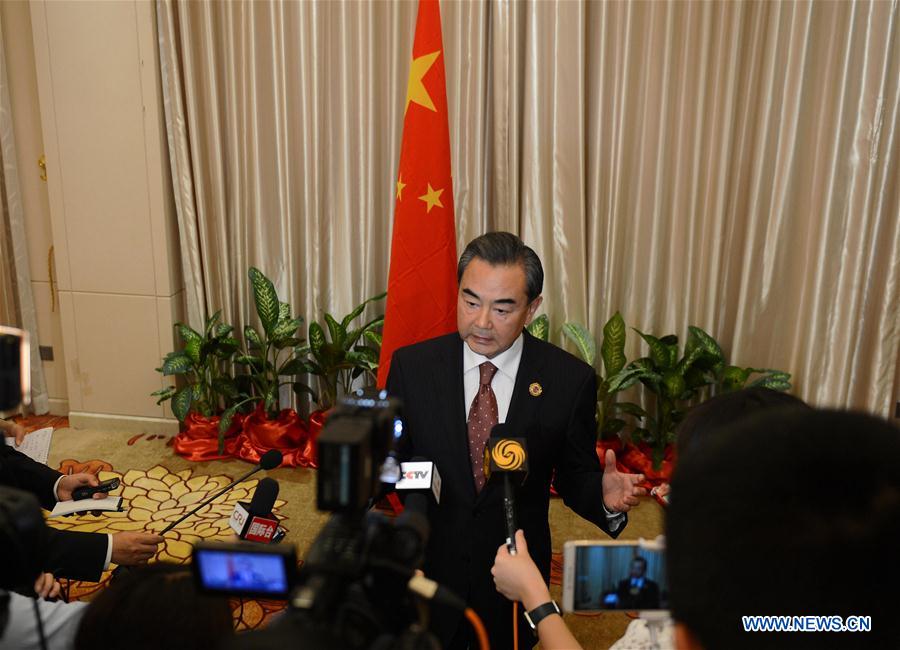


Chinese Foreign Minister Wang Yi(C) speaks to the press after the meetings in Vientiane, capital of Laos, on July 26, 2016.(Photo/Xinhua)
VIENTIANE, July 27 -- Chinese Foreign Minister Wang Yi said here on Tuesday that the political manipulation behind the arbitral tribunal will be revealed, in response to the comments made by some foreign ministers on the South China Sea arbitration case.
Wang expounded on China's position when attending the 6th East Asia Summit Foreign Ministers' Meeting held in the Lao capital Vientiane.
Wang said China has not participated in the arbitration case and will not accept the so-called ruling, a position that China has made clear since day one and is supported by strong legal basis.
By adopting this position, China is safeguarding the sanctity and impartiality of the United Nations Convention on the Law of the Sea (UNCLOS), said the Chinese foreign minister.
First, the arbitration unilaterally initiated by the former Philippine government violated the principle of having the consent of concerned parties as the basis of arbitration and failed to meet the prerequisite of conducting full exchange of views beforehand, thus lacking the legal conditions to be initiated.
What the former Philippine government had done also abandoned bilateral agreements between China and the Philippines and violated Article 4 of the Declaration on Conducts of the Parties in the South China Sea (DOC) as well as the principle of estoppel prescribed in international law, according to Wang.
Second, he said, the subject matters of the arbitration, however packaged, in fact directly concern territorial sovereignty and maritime delimitation which are beyond the scope of the UNCLOS and the jurisdiction of the ad hoc tribunal. It is a typical act of overstepping the power and ultra vires as well as the abuse of dispute arbitration mechanism.
Wang said by citing a prominent legal expert from Europe that the arbitration case undoubtedly touches upon territorial sovereignty which is not governed by the UNCLOS. The tribunal's practice of separating territorial sovereignty dispute with the status of islands and reefs is unseen in international law, which is like "putting the cart before the horse."
Third, the ruling of the ad hoc tribunal is full of obvious mistakes, Wang said. It blatantly uses its self-invented rules to negate and deprive the lawful and legitimate territorial sovereignty, maritime rights and interests of parties concerned. In particular, it says that Taiping Dao, the largest island in the Nansha Islands with an area of 500,000 square meters, is a rock and has no relevant maritime rights.
If such a judgment can legally stand, the sea map of the world will need to be redrawn, Wang said.
Wang stressed that this ruling runs counter to the spirit of international rule of law as well as the principle and spirit of the UNCLOS.
"This arbitration is imbued with question marks and fallacies in terms of procedure, legal application, fact finding and evidence gathering," he said.
The so-called ruling is illegal in three aspects: the initiation of the arbitration is illegal, the set-up of the tribunal is illegal, and the result of the arbitration is illegal. Therefore, China's stance is fully legitimate which serves the purpose of upholding international equity and justice and regional peace and stability, Wang said.
The Chinese foreign minister said more and more countries have come to see the nature and danger of the arbitration case, and understand and acknowledge China's stance to resolve disputes through direct negotiation and consultation, calling for respect to the rights of sovereign states to independently choose dispute settlement means including respecting the declaration on optional exceptions made under Article 298 of the UNCLOS.
There are also more and more legal experts around the world questioning the legality of the arbitration case and the fairness of the ruling, Wang said, noting that the illegal nature of the so-called South China Sea arbitration case and the political manipulation hidden behind the ad hoc arbitral tribunal will be further revealed.
Day|Week

 Who Will Fit The Chinese Roles In Game Of Thrones?
Who Will Fit The Chinese Roles In Game Of Thrones? China's Hubei Shennongjia added to World Heritage List
China's Hubei Shennongjia added to World Heritage List Cute Dog At Fruit Stand Becomes Latest Internet Sensation
Cute Dog At Fruit Stand Becomes Latest Internet Sensation Thai most beautiful transgender Nong Poy release new photos
Thai most beautiful transgender Nong Poy release new photos Top 10 livable Chinese cities
Top 10 livable Chinese cities The last primitive tribe in China
The last primitive tribe in China China's first intelligent security robot debuts in Chongqing
China's first intelligent security robot debuts in Chongqing A Total of 3,552 Subscribers Vanish In Two Days; YouTube Closes All Doors to Users’ Inquiries
A Total of 3,552 Subscribers Vanish In Two Days; YouTube Closes All Doors to Users’ Inquiries Out of this world! Futuristic UFO-shaped yacht has its own garden and a stunning underwater viewing deck
Out of this world! Futuristic UFO-shaped yacht has its own garden and a stunning underwater viewing deck An old tea house in Chengdu
An old tea house in Chengdu